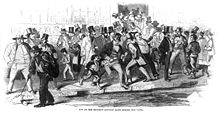Our website is made possible by displaying online advertisements to our visitors.
Please consider supporting us by disabling your ad blocker.
Panic of 1857
- Northwest Ordinance
- Kentucky and Virginia Resolutions
- End of Atlantic slave trade
- Missouri Compromise
- Tariff of 1828
- Nat Turner's Rebellion
- Nullification crisis
- End of slavery in British colonies
- Texas Revolution
- United States v. Crandall
- Gag rule
- Commonwealth v. Aves
- Murder of Elijah Lovejoy
- Burning of Pennsylvania Hall
- American Slavery As It Is
- United States v. The Amistad
- Prigg v. Pennsylvania
- Texas annexation
- Mexican–American War
- Wilmot Proviso
- Nashville Convention
- Compromise of 1850
- Uncle Tom's Cabin
- Recapture of Anthony Burns
- Kansas–Nebraska Act
- Ostend Manifesto
- Bleeding Kansas
- Caning of Charles Sumner
- Dred Scott v. Sandford
- The Impending Crisis of the South
- Panic of 1857
- Lincoln–Douglas debates
- Oberlin–Wellington Rescue
- John Brown's raid on Harpers Ferry
- Virginia v. John Brown
- 1860 presidential election
- Crittenden Compromise
- Secession of Southern states
- Peace Conference of 1861
- Corwin Amendment
- Battle of Fort Sumter

The Panic of 1857 was a financial crisis in the United States caused by the declining international economy and over-expansion of the domestic economy. Because of the invention of the telegraph by Samuel F. Morse in 1844, the Panic of 1857 was the first financial crisis to spread rapidly throughout the United States.[1] The world economy was more interconnected by the 1850s, which made the Panic of 1857 the first worldwide economic crisis.[2] In Britain, the Palmerston government circumvented the requirements of the Bank Charter Act 1844, which required gold and silver reserves to back up the amount of money in circulation. Surfacing news of this circumvention set off the Panic in Britain.[3]
Beginning in September 1857, the financial downturn did not last long, but a proper recovery was not seen until the onset of the American Civil War in 1861.[4] The sinking of SS Central America in September 1857 contributed to the panic, since New York City banks were waiting on a much-needed shipment of gold that was being transported by the ship. After the failure of Ohio Life Insurance and Trust Company, the financial panic quickly spread with businesses beginning to fail, the railroad industry experiencing financial declines, and hundreds of thousands of workers being laid off.[5]
Because the years immediately preceding the Panic of 1857 were prosperous, many banks, merchants, and farmers had seized the opportunity to take risks with their investments, and, as soon as market prices began to fall, they quickly began to experience the effects of financial panic.[4] American banks did not recover until after the Civil War.[6]
- ^ Fulfer, Johnny (January 6, 2022). "Panic of 1857: A Story of Speculative Finance". The Economic Historian. Retrieved August 9, 2022.
- ^ See the "Preface" contained in the Collected Works of Karl Marx and Frederick Engels Volume 28 (International Publishers: New York, 1986) p. XIII.
- ^ See note 238 contained in the Collected Works of Karl Marx and Frederick Engels Volume 12 (International Publishers: New York, 1979) p. 669-670.
- ^ a b Glasner, David (1997). Business Cycles and Depressions: An Encyclopedia. Philadelphia, Pennsylvania: Library of Congress. pp. 128–132. ISBN 978-0-8240-0944-1.
- ^ "A House Divided". Dickinson College. Retrieved March 4, 2011.
- ^ Burlingame, Liz (August 23, 2013). "Sunken Treasures: The World's Most Valuable Shipwreck Discoveries". The Weather Channel. Archived from the original on October 6, 2014.
Previous Page Next Page


